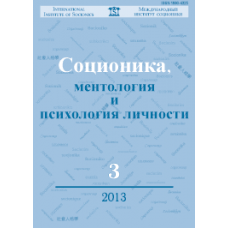Номер № 3/2013 журналу «Соціоніка, ментологія та психологія особистості»
Дослідження
Букалов А.В., Карпенко О.Б.
Соціоніка як академічна наукова дисципліна
Широке поширення соціоніки як наукового напряму підтверджується тим, що за останні 15 років соціонічні ідеї та методи використані більш ніж у 800 дисертаціях з усіх розділів гуманітарних наук та в ряді технічних наук. Проведено аналіз таких дисертаційних робіт з галузей та тем. більш ніж у 150 університетах Росії, України, країн СНД та країн Європейського союзу.
Ключові слова: соціоніка, психологія, менеджмент, соціологія, гуманітарні науки, технічні науки, педагогіка, економіка, філософія.
Фролова М.Г.
Інтуїція часу в інтуїтів
Розглянуто особливості роботи чотиривимірних (що розташовуються на 1-й та 8-й позиції в моделі А) та тривимірних (розташованих на 2-й та 7-й позиції в моделі А) функцій за аспектом «інтуїція часу». br> Ключові слова: соціоніка, інтуїція часу, мірність психічної функції, інформаційна модель психіки.
Бєлецька І.Є.
Як обійти обмеження психологічного типу (на прикладі процесу діагностики ТІМу)
Аналізуються причини складнощів, що виникають при діагностиці соціонічного типу, які безпосередньо залежать від типових особливостей типувальників Даються конкретні рекомендації щодо їх усунення на різних етапах процесу діагностики.Ключові слова: ознаки типу, діагностика типу, етапи діагностичного процесу, статика, динаміка, процес, результат, позитивізм, негативізм.
Медведєва І.А.
Вербальна самопрезентація через призму типу інформаційного метаболізму. Соціонічні особливості тактик самопрезентації СЕІ. сенсорно-етичного інтроверта. Описано деякі з мовленнєвих формул успішної самоподачі та надано рекомендації щодо їх застосування. аспекти. Математичні методи в соціоніці
Щеглов В.Н.
Соціоніка та психонетика: інтерпретація основних понять за допомогою алгоритму побудови АМКЛ
Запропоновано формалізація основних понять соціоніки за допомогою алгебраїчних моделей інтуїціоністської логіки.
Ключові слова : інформація, інтуїціонізм, психічні структури, соціальні структури, соціоніка, типи особистості.
Дискусії
Тангеманн О.Б.
Соціологічне опитування «Назви типів та функцій у соціоніці»
На початку 2013 року було проведено соціологічне інтернет-опитування на тему «Назви функцій і типів». Опитано дистанційно 60 осіб. прошарків соціонічного співтовариства: керівники соціонічних центрів, більш і менш відомі автори, студенти. щодо використання різних систем позначень функцій та типів російською та англійською мовами. Аналіз опитування виявив майже одноголосне бажання соціоніків виробити загальні стандарти соціонічної номенклатури; I> опитування, соціоніка, назва, абревіатура, функція, психотип, система позначень.
Практика типування
Мегедь В.В.
Характеристики 16-ти типів та 32-х підтипів
Представлені описи соціонічних типів, у 2-х підтипах кожен.
Ключові слова: соціоніка, тип, опис, термінальний підтип, ініціальний підтип.
Від першої особи
Стрілка Д.А.
О, Господи, я «Дон Кіхот», і дякую тобі за це!
Опис досвіду автора, в результаті якого він отримав «живі» знання про те, що сприяє створенню міцних, комфортних, довірчих та відносин, що приносять радість. Ключові слова: соціоніка, тип інформаційного метаболізму, інтуїція можливостей, структурна логіка, етика відносин, больова функція, творча функція, базова функція.
Про авторів
Summary
Соціоніка 3/2013
- Модель: выпуск журнала «Соционика…»
-
$3.00
- Ціна в бонусних бали: 30

